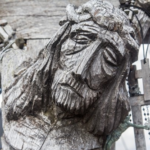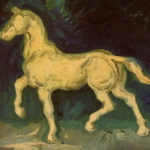We run our website the way we wished the whole internet worked: we provide high quality original content with no ads. We are funded solely by your direct support. Please consider supporting this project.

Did God Kill King Saul?
When we approach Scripture with the assumption that it is all God-breathed for the purpose of bearing witness to Christ, even the most trivial contradictions in Scripture can acquire theological significance. This is what I argue in Cross Vision. Here I want to illustrate this by briefly discussing the theological significance of a curious discrepancy in one of the biblical accounts of King Saul’s death.
In 1 Chronicles, we read that after Saul was gravely wounded in a battle with the Philistines, he implored his armor-bearer to kill him so he would not be captured and tortured to death by his enemies. The armor-bearer could not bring himself to do this, however, so Saul decided to take his own life (10:3-4). Interestingly enough, the author goes on to explain that Saul died because he “did not keep the word of the LORD” and did not “inquire of the LORD,” but instead “consulted a medium for guidance.” For this reason, the author concludes, “the LORD put him to death and turned the kingdom over to David …” (vss. 13-4, emphasis added). The obvious question is, how can this author claim that Saul killed himself while also claiming that the Lord killed him?
One could of course explain this conflict by proposing that this author/redactor spliced together different authoritative traditions that contained conflicting accounts of Saul’s death. Alternatively, one could account for the discrepancy by appealing to any number of exegetical considerations.
But the discrepancy acquires a much more profound significance when we reflect on it in a crucicentric way. As a judgment of Saul’s rebellion, Yahweh had withdrawn his protection of Saul, thus allowing spirits to torment him. He also had allowed Saul to sink deeper and deeper into his self-chosen sin as he consulted a medium at Endor (1 Sam 28; cf., Deut 18:9-14) and foolishly headed into battle without Yahweh’s instruction to do so and without his protection. Yet, while Yahweh was not responsible for Saul’s sinful decisions or for the self-destructive consequences of these decisions that resulted in his suicide, Yahweh nevertheless assumed responsibility for them by allowing himself to be depicted as doing what he merely allowed. In this way, the portrait of the Lord putting Saul to death can be understood as a literary crucifixion, pointing to the crucified God who takes responsibility for the sin of the world.
Image: “Death of King Saul”, 1848 by Elie Marcuse (Germany and France, 1817–1902)
Category: General
Tags: Cruciform Theology
Related Reading

When God Wears Masks
At various times throughout the OT we find Yahweh assuming the role of a tester, refiner, punisher and even an enemy of Israel (e.g. Jer. 9:7; Lam. 2:5; Isa 63:10). Yet, when we examine these roles, or masks, in the light of the crucified Christ and the broader canonical witness, it becomes clear that these…

Do the Gospels Fabricate Prophetic Fulfillment?
Skeptically-inclined scholars, and especially critics of Christianity, frequently argue that the Gospel authors created mythological portraits of Jesus largely on the basis of OT material they claim Jesus “fulfilled.” In other words, they surveyed the OT and fabricated stories about how Jesus fulfilled those prophecies. In response, it’s hard to deny that there are certain…

5 Differences Between The Kingdom of God and the Kingdom of the World
Image by matthijs rouw via Flickr The kingdom of God looks and acts like Jesus Christ, like Calvary, like God’s eternal, triune love. It consists of people graciously embracing others and sacrificing themselves in service to others. It consists of people trusting and employing “power under” rather than “power over,” even when they, like Jesus, suffer because…

The Cross Reveals God’s Love
The central way Christ functions as the perfect image and exact representation of God is by dying on the cross. While Christ’s entire life manifests the true God, Christ came primarily to die. It was his death that defeated the devil and freed us from bondage. The one who does what is sinful is of…

God’s Kind of Warfare
Over and over, and in a variety of different ways, we are told that, while “[s]ome trust in chariots and some in horses,” Israelites were to “trust in the name of the LORD our God” (Ps 20:7), for “[n]o king is saved by the size of his army” and “no warrior escapes by his great…

When the Last Few Moments Changes Everything
One of the central things ReKnew wants to accomplish is to challenge followers of Jesus to accept that the self-sacrificial love Jesus revealed on the cross is the definitive, and even the exhaustive, revelation of God’s character. Everything about God, we believe, should be understood through the lens of the cross. For most Christians, Jesus…
